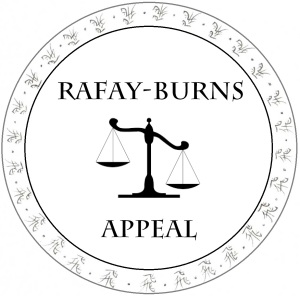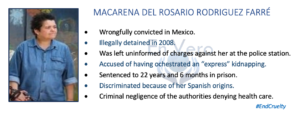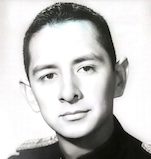In charge of the Burns and Rafay Case: Inès.
En Vero supports the work of Innocence International in defense of Sebastian Burns and Atif Rafay.
Summary
Source: Rafay and Burns Appeal
In May of 2004, Sebastian Burns and Atif Rafay were convicted of the July 1994 murder of Rafay’s parents, Tariq and Sultana, and his sister, Basma.
At the time of the murders, the Rafay family had recently immigrated to Bellevue, Washington from Vancouver, B.C. Their 18-year-old son, Atif, had been away for his freshman year at Cornell University and was visiting his parents in Bellevue with his high school friend, Sebastian. On the night of Tuesday, July 12, 1994, Atif and Sebastian took the Rafay family car and went out to dinner, a movie, and a night club. Their presence at each of these locations was confirmed by employees and other witnesses. When the two boys returned to the Rafay home around 2AM on July 13, they found Rafay’s mother and father had been bludgeoned to death. afay’s sister had also been attacked and, though still alive, would die in the hospital later that morning.
Sebastian made a 911 call and the two boys cooperated fully with the Bellevue police. They provided the officers with their clothing and submitted to an alternative light source test that is able to detect any traces of blood, but no evidence of blood was found on them anywhere. The boys were questioned, with no legal counsel present, first at the Bellevue Police Department and later at a Bellevue motel the police arranged for the boys. On July 14, the boys provided detectives with videotaped statements. On July 15, the Canadian consulate obtained permission from the Bellevue Police to return the boys to their families in Canada. The boys were not informed that a funeral for Atif’s parents and sister would occur that day, and media coverage later presented this as a cold-hearted act of fleeing across the border with no thought for the funeral.
In the days following the murders the Bellevue Police Department received three tips through other law enforcement agencies: one from Constable Gelinas with the Royal Canadian Mounted Police (RCMP), one from an FBI informant, and one from the Intelligence Division of the Seattle Police. The confidential RCMP informant told Constable Gelinas of a man who had been offered a $20,000 contract to kill an East Indian family that had previously lived in Vancouver, Canada and had moved to Bellevue, Washington. The informant also told Gelinas that he heard this information two days before the murders were committed. Officer Gelinas contacted Bellevue investigators Robert Thompson and Jeff Gomes—the lead investigators on the Rafay murders—and communicated the information to them. The Bellevue investigators traveled to Vancouver and knocked on this man’s door twice. He was either not home or was not answering the door. The Bellevue Police returned to the United States without making contact. About five days after the homicides, the Bellevue Police Department received a call from the FBI advising that one of their informants was coming to provide information about the murder of the Rafay family. The FBI Informant told Detective Gomes of the Bellevue Police that a militant Islamic faction said that Dr. Tariq Rafay should die because of his beliefs and teachings about the Koran. The FBI informant also said that several days after the homicides a member of this militant Islamic faction came to his house and was worried that the FBI informant had seen a baseball bat that he and some other men were carrying around in their car. Because of this, the FBI Informant believed the murder weapon was a baseball bat, which in fact it was. With this information, the Bellevue investigators learned that the FBI informant knew the identity of the murder weapon before this information was made public. The informant provided names, addresses, and phone numbers to the police. However, Bellevue investigators never followed up on these leads. The Seattle Police Intelligence Division called the Bellevue Police Department and told them they had information that al-Fuqra, a radical and militant organization, that may have been involved in these homicides. However, the Bellevue police did not follow up on this information either. They did not question any members of the Islamic community in Bellevue to find out if Dr. Rafay had conflicts with Muslims in the area.
In January of 1995, the RCMP met with Bellevue police and decided to initiate an ethically murky sting operation to elicit confessions from Sebastian and Atif. The RCMP have long practiced an undercover technique known as Mr. Big, in which suspects are recruited to take part in fictitious criminal activities on behalf of a fictitious crime boss called Mr. Big. Through these activities, undercover RCMP officers build trust with the suspects until confessions to unsolved crimes are elicited. Both the ethics of Mr. Big tactics and the veracity of resulting evidence have long been under scrutiny, as such tactics are illegal in most countries. The RCMP undercover officers first lured Sebastian into participating in fictitious criminal activity in April of 1995, with the promise of money. They continued to develop a relationship with him in the months that followed. In doing so, they took advantage of the immaturity of a teenage boy, making the 19-year-old Sebastian feel important and trusted. Eventually, Atif and another friend, Jimmy Miyoshi, were also lured in. The RCMP undercover officers convinced the boys that they could make all suspicions the Bellevue Police had concerning the boys’ involvement in the murder disappear if only Sebastian and Atif would prove they were trustworthy by giving a videotaped confession to the murders. The two teenage boys, feeling intimidated by these older adult “criminals”, complied. Although such tactics are illegal in the United States, Washington courts later allowed jurors to view these videotaped confessions. Jimmy Miyoshi, who did not give a video confession, would later be granted immunity from his charge of conspiracy to commit murder in return for statements incriminating Sebastian Burns and Atif Rafay.
In July of 1995, Sebastian and Atif were incarcerated in maximum security pre-trial facilities in Vancouver, where they would remain for the next six years. In March of 2001, Sebastian and Atif were extradited to the United States. They were convicted of three counts of first-degree murder in May of 2004. The decision was appealed in 2011, but the appeal request was struck down by the Washington State Supreme Court.
In July 2014, the Supreme Court of Canada ruled that there are limitations on admissibility of evidence obtained through Mr. Big operations. As a result, several convictions from the past several decades may now be eligible for appeal, including the Rafay-Burns case. In October 2014, a new appeal was filed.
Current Situation:
The Supreme Court of Canada ruled in July 2014 that some Mr. Big tactics yield evidence that is not admissible in court. In light of this ruling, several past Mr. Big convictions may be eligible for appeal, including the Rafay-Burns case.
A new appeal for the Rafay-Burns case was filed in October 2014 and is now being processed. As of July 2018, appeals for Sebastian Burns have been exhausted and state-level appeals for Atif Rafay have been exhausted in the Washington State Supreme Court. Rafay now awaits habeas corpus proceedings in the 9th Circuit United States District Court for the Western District of Washington.
– More information: http://rafayburnsappeal.com/

News:
- News on Nov. 29, 2019: ‘The Confession Tapes’ (Netflix) Re-Opens the Triple-Murder Case of Sebastian Burns and Atif Rafay (Seattle Weekly)
- News on July 21, 2017: Rafay and Burns: 3 innocence projects now believe men innocent (CBC News)
- News on April 19, 2016: Opinion on the Burns & Rafay Case (CART EDIT)
- News on January, 17th 2016: An unexpected ally for a convicted “killer” (North Shore News)
- News on February 5th, 2015: Interview with Ken Klonsky (FEMCAI, program “Desde la raíz“, hosted by Patricia Barba and Alberto Ramirez)
- News on January 25th, 2015: Essay by Ken Klonsky on the Burns and Rafay Case (Innocence International)




